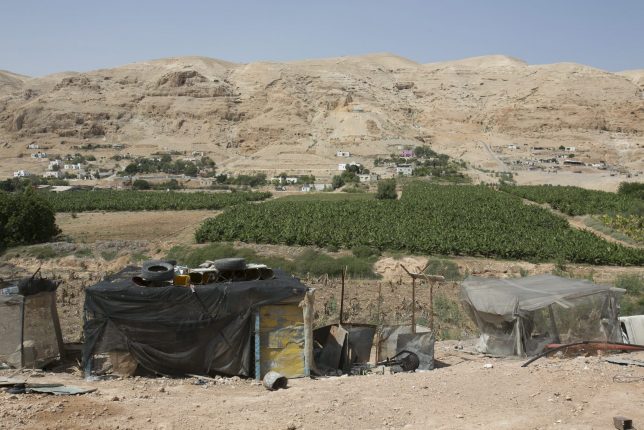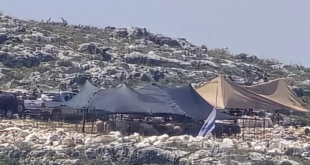Israel’s Civil Administration in the West Bank is advancing a plan to expel thousands of Bedouin from lands east of Jerusalem and forcibly relocate them to a new town in the Jordan Valley.
Between late August and last week, the administration published nine plans that together comprise the master plan for the proposed new town north of Jericho. The plans were drafted without consulting the Bedouin slated to live there, in violation of the Supreme Court’s recommendation.
In explanatory notes to the plans, to which the public now has 60 days to submit objections, the administration said its proposal suits the “dynamic changes” Bedouin society is undergoing as it moves from an agricultural society to “a modern society that earns its living by commerce, services, technical trades and more.”
The town is slated for about 12,500 Bedouin from the Jahalin, Kaabneh and Rashaida tribes. It is the third and largest of the towns the administration has designated for Bedouin in the West Bank.
The first is already inhabited by some 300 Jahalin Bedouin, though a portion of this plan has been frozen due to its dangerous proximity to the Abu Dis dump. The second, to be located in the northern Jordan Valley, is still in the planning stage.
Concentrating the Bedouin into a few permanent towns represents the culmination of a 40-year process of limiting their pasturage, restricting their migrations and refusing to let them build permanent homes in places where they have lived for decades. This process accelerated after the Oslo Accords were signed in 1993.
Since then, the Civil Administration has issued thousands of demolition orders against Bedouin tents and shacks, to which the Bedouin frequently responded by petitioning the High Court of Justice.
Shlomo Lecker, a lawyer who represented the Bedouin in nearly 100 such cases, told Haaretz that while the court never addressed his claim that the Bedouin were being discriminated against in comparison to Jewish settlers, it did accept his argument that they can’t be evicted when they have no other place to live. That is what prompted the Civil Administration to start planning new towns for them.
The latest plan was commissioned from a Palestinian firm called Asia, which is based in Ramallah. Members of the Rashaida tribe already live on the land earmarked for the new town, to be called Talet Nueima, and four years ago, they consented in principle to its establishment. Rashaida representatives told Haaretz they were reassured by the fact that the planners were Palestinian.
But two years ago, after the plan to relocate some of the Bedouin to the town near the Abu Dis dump was frozen, the Civil Administration altered the original plan for Talet Nueima, deciding to expand the town significantly and use it to house Bedouin from other areas and tribes as well.
Thus the plan grew from a town of some 370 dunams earmarked solely for the Rashaida tribe to one of 1,460 dunams earmarked for three different tribes. The town will be divided into 1,129 half-dunam plots, each of which is supposed to contain two houses plus one agricultural building.
The Palestinian Authority objects to the plan, saying it undermines the PA’s own plan to build a city nearby. While the land is located in Area C, the part of the West Bank under full Israeli control, it is adjacent to Area A, which is under PA control.
During hearings on the petitions filed by Lecker, the High Court repeatedly advised the state to hold a dialogue with the Bedouin before completing the plan.
“We know a little of the history of relocation attempts; we’re aware that there is vehement opposition,” High Court Justice Uzi Vogelman said in April. “The question is whether such processes — which are structural, something at the level of the tribe — shouldn’t be implemented via a higher level of dialogue… The question is whether there is any dialogue forum beyond the announcements or the legal forum. My assessment is that without dialogue, it will be hard to implement these things.”
Jamil Hamadin, a member of the Jahalin tribe, told Haaretz the Civil Administration never consulted with his clan or any other Jahalin clans about the plan. He added that not only does putting different tribes into the same town run counter to Bedouin customs, but so does putting different clans from the same tribe into the same town.
“We’ve replaced wool tents with tin shacks and prefab homes, but that doesn’t mean we’ve changed our customs and laws, which obligate us to live and herd at a great distance from each other, or our need to live in open spaces,” he said.
At a meeting with government attorneys and Civil Administration officials on Thursday, Lecker asked whether, in light of Bedouin opposition to the plan, “the intention is to put the Bedouin on trucks,” as was done to the Jahalin in 1997, when they were evicted from lands that later became part of the settlement of Ma’aleh Adumim.
“We won’t put them on trucks,” said Yuval Turgeman, the administration’s director of Bedouin affairs. “But we’ll take immediate action to demolish their residences and agricultural buildings, because there is an alternative here.”
A spokesman for the Coordinator of Government Activities in the Territories said dozens of meetings were held with Bedouin leaders.
As part of the effort to draft master plans “for the benefit of the area’s Bedouin population,” whose purpose is to allow the Bedouin to live in places with suitable infrastructure, the spokesman said, several plans to prepare such places have been advanced, partly through such meetings.
Once the plans are completed and building plots have been allocated, he added, all illegal Bedouin construction “will be dealt with in accordance with the law.”

 العربية
العربية עברית
עברית Türkiye
Türkiye Русский
Русский Français
Français We Watch Israeli Violations Specialized website in monitoring and documenting Israeli violations against Palestinians
We Watch Israeli Violations Specialized website in monitoring and documenting Israeli violations against Palestinians






